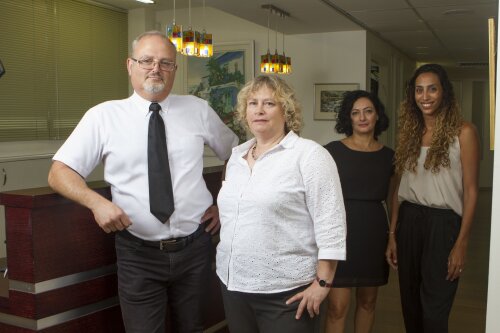Best Faith-Based Law Lawyers in Jerusalem
Share your needs with us, get contacted by law firms.
Free. Takes 2 min.
List of the best lawyers in Jerusalem, Israel
About Faith-Based Law in Jerusalem, Israel
Faith-Based Law in Jerusalem, Israel, is a unique legal framework where religious and civil legal systems coexist and often interplay. Jerusalem, being the epicenter of significant religious traditions-Judaism, Christianity, and Islam-has established courts that handle personal status matters based on the individual's religious affiliation. These courts have authority over issues such as marriage, divorce, custody, and inheritance, and they operate alongside the secular legal system, offering a distinctive approach to legal matters, reflecting the city's multicultural tapestry.
Why You May Need a Lawyer
If you are navigating issues related to marriage, divorce, child custody, or inheritance within the context of your faith, you may need a legal professional specializing in Faith-Based Law. Problems often arise when individuals face complex interfaith or intrafaith legal disputes, or when individuals require guidance on how religious laws intersect with Israeli civil laws. Understanding jurisdiction and the interplay between these legal domains requires specialized legal expertise. Also, expatriates living in Jerusalem might need a lawyer to handle their personal status issues in accordance with their religious and cultural practices or to resolve any potential conflicts between different faith-based systems.
Local Laws Overview
In Jerusalem, Faith-Based Law operates alongside Israeli civil law. The key religious courts are the Rabbinical Courts (for Jewish matters), Sharia Courts (for Islamic matters), and various ecclesiastical courts for different Christian denominations. Each court derives its authority from both the religious texts pertinent to the respective religion and Israeli law, which recognizes these courts' jurisdictions. The Rabbinical Courts handle Jewish marriage and divorce cases, relying largely on Halakha (Jewish religious law), while Sharia Courts and ecclesiastical courts govern similar matters for Muslims and Christians. It’s essential to understand that issues like marriage and divorce recognized under one religious court may not be recognized in another, highlighting the importance of legal counsel in these matters.
Frequently Asked Questions
What is Faith-Based Law?
Faith-Based Law refers to legal practices and systems that are based on religious doctrines and are specifically applied to personal status issues like marriage, divorce, and inheritance.
How does Faith-Based Law interact with civil law in Israel?
Faith-Based Law operates in conjunction with civil law in issues of personal status. While religious courts govern personal matters, civil courts may handle cases that involve public concerns, secular laws, or where there is no religious jurisdiction.
Can non-Israelis use Faith-Based legal systems in Jerusalem?
Yes, non-Israelis can utilize these legal systems, especially if they are residents of Israel or if their issue falls within the jurisdiction of the faith-specific court applicable to them.
What legal areas do Rabbinical Courts cover?
Rabbinical Courts primarily address matters of marriage, divorce, and personal status according to Jewish Halakha. They also handle issues relating to conversion and Jewish identity.
Are Sharia Courts exclusive to Muslims?
Yes, Sharia Courts in Jerusalem handle personal status issues within the Muslim community, based on Islamic law.
What can be done if an individual from one faith marries someone from another faith?
Interfaith marriages may face complexities in Faith-Based legal systems. Often, such couples must seek civil legal avenues to address their marital status, as many religious courts may not recognize interfaith marriages.
Can a civil divorce affect religious marriage status?
Yes, a civil divorce will not dissolve a religious marriage; a separate religious divorce procedure is required to fully sever the marital ties in the religious context.
What is the role of ecclesiastical courts?
Ecclesiastical courts cater to the personal status issues of different Christian communities in Jerusalem, governing marriage, divorce, and other personal matters according to their denominational rules.
How can lawyers assist in Faith-Based legal matters?
Lawyers can provide representation and advice on navigating complex religious legal systems, ensuring compliance with both civil and religious laws, and mediating interfaith legal disputes.
Is mediation possible in Faith-Based legal disputes?
Yes, mediation is a viable option that can be used to resolve disputes, especially in cases involving families with mixed religious backgrounds or those willing to seek amicable solutions outside the courts.
Additional Resources
Some helpful resources include the Jerusalem Rabbinical Court, Jerusalem Sharia Court, and the various Christian ecclesiastical courts. The Ministry of Justice in Israel and the Chief Rabbinate may also provide valuable information and assistance. Non-governmental organizations like the Israel Religious Action Center offer legal services relating to religious freedom and rights in Israel.
Next Steps
If you find yourself needing assistance with Faith-Based Law in Jerusalem, begin by consulting with a legal expert who specializes in the relevant religious or civil legal systems of Israel. They can help you understand your rights and obligations, and guide you through the necessary legal processes, ensuring that your case is handled with due regard for the complex intersection of faith and law in Jerusalem.
Lawzana helps you find the best lawyers and law firms in Jerusalem through a curated and pre-screened list of qualified legal professionals. Our platform offers rankings and detailed profiles of attorneys and law firms, allowing you to compare based on practice areas, including Faith-Based Law, experience, and client feedback.
Each profile includes a description of the firm's areas of practice, client reviews, team members and partners, year of establishment, spoken languages, office locations, contact information, social media presence, and any published articles or resources. Most firms on our platform speak English and are experienced in both local and international legal matters.
Get a quote from top-rated law firms in Jerusalem, Israel — quickly, securely, and without unnecessary hassle.
Disclaimer:
The information provided on this page is for general informational purposes only and does not constitute legal advice. While we strive to ensure the accuracy and relevance of the content, legal information may change over time, and interpretations of the law can vary. You should always consult with a qualified legal professional for advice specific to your situation.
We disclaim all liability for actions taken or not taken based on the content of this page. If you believe any information is incorrect or outdated, please contact us, and we will review and update it where appropriate.












